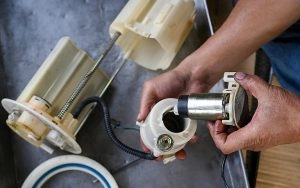The fuel pump is a critical component in a car's fuel system, working to pump fuel from the fuel tank to the engine. It's essential to understand the role of the pump in the car and know how to maintain and repair it when necessary. Therefore, we will discuss what a fuel pump is and how it works, its types, and how to choose a suitable fuel pump for your car.

What does the fuel pump do?
The car's fuel pump is a vital component that works to pump fuel from the fuel tank to the engine, doing so by generating high pressure in the fuel line. When the engine pushes the crankshaft down, a vacuum is created in the cylinder assembly, this vacuum draws fuel from the pump through the line, then the fuel is pressurized and sent to the injectors for injection into the cylinders.
It's important that your car's fuel pump is strong enough to overcome the resistance of the fuel line and the force of the movements that the car encounters while driving. Therefore, the pump is carefully designed to achieve reliable performance.
Types of Fuel Pump in a Car
There are two main types of fuel pumps: electric fuel pumps and mechanical fuel pumps, and we will discuss both types in detail.
Electric fuel pumps
Electric fuel pumps use electrical energy.The BatteryFor fuel injection, which is most common in modern cars because it is more suitable for electronic control and fuel pressure control, electric fuel pumps can be located either inside or outside the fuel tank.
The following are the types of electric fuel pumps commonly used in cars:
In-tank pump: Most modern vehicles use in-tank pumps. Since the pump is located inside the fuel tank, it provides better protection against shocks and extreme temperatures.
The in-line pump: This kind of pump is located between the fuel tank and the engine, and since it is not in the fuel tank, it is easier to replace the in-line pump than the pump that is in the tank.
Rotary Vane Pump: The rotary vane pump works in the same way as the mechanical pump in that it uses positive displacement to convey fuel. The rotary vane is installed eccentrically inside the pump, so when the vane rotates, the fuel is pushed out of the pump.
Gerotor Pump: The gerotor pump also uses the principle of positive displacement but has different components. It consists of two interlocking gears -an inner drive gear and an outer gear. As the gears rotate, they produce a positive displacement that pushes the fuel outward.
Also read:5 Signs Indicating Your Oil Siphon is Damaged

Electric fuel pumps have several advantages, including:
High Efficiency: Electric fuel pumps are known for their high efficiency in pumping fuel, which helps to improve engine performance.
Easy Maintenance: Electric fuel pumps do not require frequent routine maintenance as is the case with mechanical fuel pumps, which reduces maintenance costs.
Small Size: Electric fuel pumps come in a small size that makes them easy to install anywhere in the vehicle, as well as saving space in the car engine.
Low Noise: As the electric fuel pumps do not emit any sounds, they provide comfort and tranquility while driving the vehicle.
However, there are some drawbacks that should be considered before using electric fuel pumps, including:
Possibility of Electrical Failure: Electric fuel pumps can be affected by an electrical malfunction, leading to their operation cessation.
High Battery Consumption: Electric fuel pumps require power from the vehicle's battery to operate, leading to higher battery consumption.
Mechanical Fuel Pump
The mechanical fuel pump is usually used in old and classic cars that use a simple and uncomplicated fuel system. These pumps operate through the mechanical motion of the engine by the belt or crankshaft to generate the necessary power to pump fuel to the engine. They have several advantages, including:
Its simplicity: Consisting of only two parts, the rotating piece and the stationary piece, which makes it less prone to malfunctions.
High efficiency: Mechanical fuel pumps have high efficiency in pumping fuel, which helps to improve engine performance.
Long Lifespan: Mechanical fuel pumps are characterized by their durability and robustness, which makes them last for a long period before replacement.
However, there are some flaws that make the mechanical fuel pump less than ideal in certain situations, including:
Component Wear: Mechanical fuel pump components can be affected by wear over time, which leads to a decrease in their efficiency.
Noise: Mechanical fuel pumps emit loud noises due to vibrations resulting from mechanical movement, which can cause annoyance.
Periodic Maintenance: The use of mechanical fuel pumps requires frequent periodic maintenance to keep them in good condition, which increases the maintenance cost.

How to choose the appropriate fuel pump for your car?
It is important to choose a suitable fuel pump for your car according to its individual needs. The following tips can be used to choose the appropriate pump:
Type: The appropriate pump type depends on the type of your car and the application you need.
Pressure: You should choose a fuel pump that produces appropriate pressure for your car and the application you use.
Capacity: You should choose the pump that meets the basic size your car needs.
Efficiency: A choice must be made.Fuel PumpIt is characterized by high efficiency and good performance.
Quality: You should select a fuel pump made from high-quality materials and meets safety and quality standards.

Comments